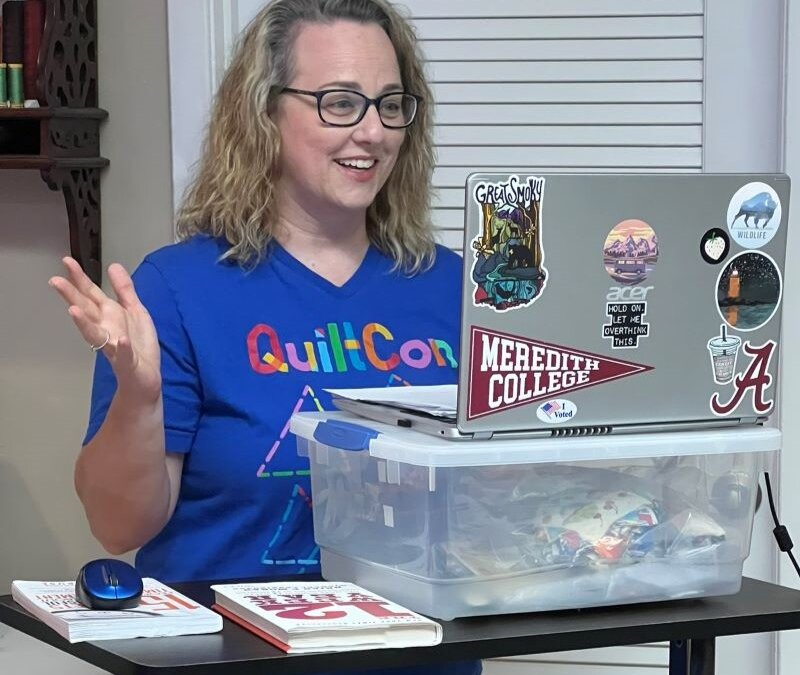
Whether your guild has hired a seasoned quilt teacher known to the masses, or a talented newbie, there’s always room for improvement with kind suggestions from our peers. Though I have been quilting for nearly 30 years, I only started providing lectures and workshops to guilds a couple of years ago. The experiences I have had with guilds have been overwhelmingly positive.
Providing workshops and lectures to guilds is my favorite part of being a professional in the quilt biz. Being a part of an established camaraderie for a few days, or just an hour via Zoom, recharges the extrovert in me.
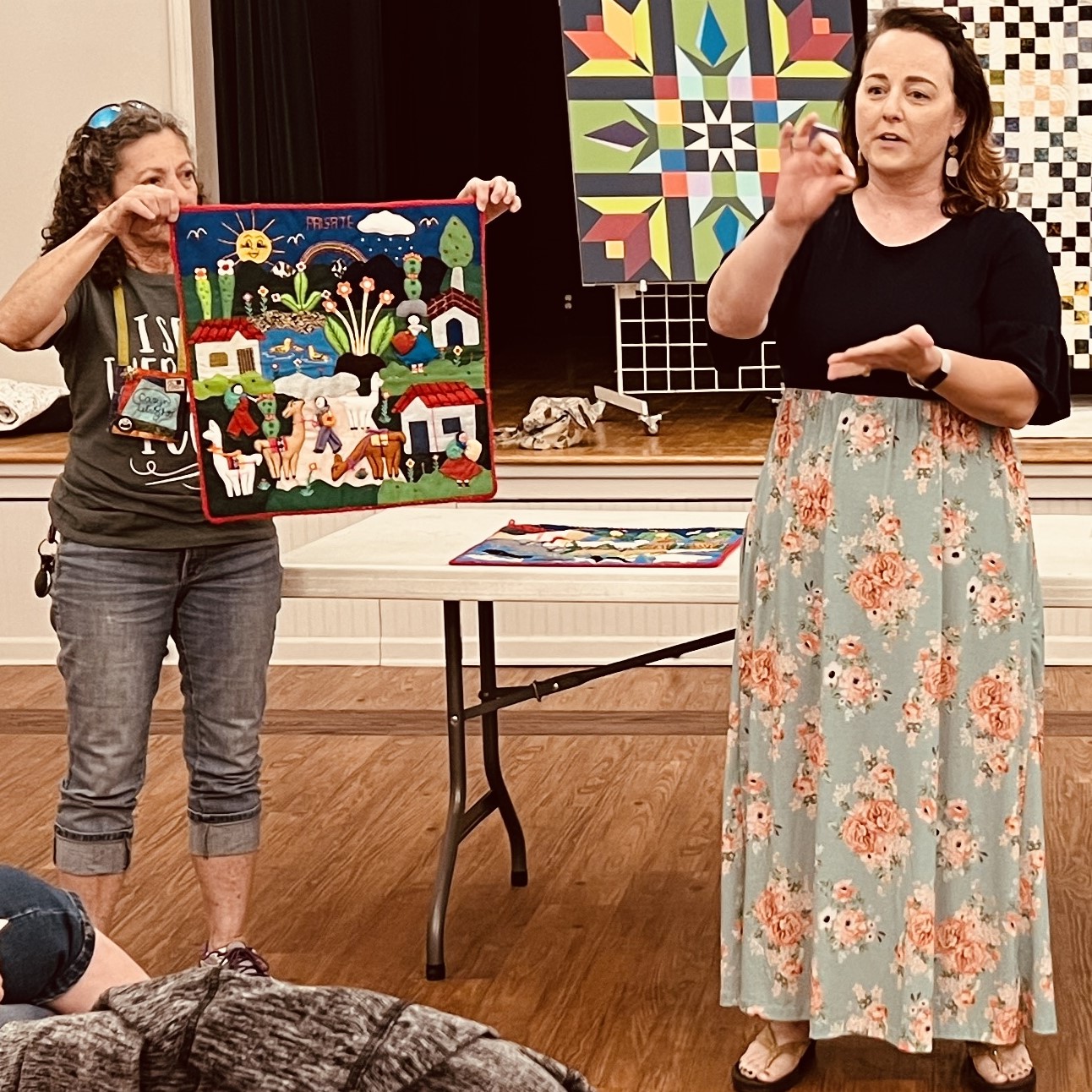
Me giving my Arpilleras lecture to the Gate City Quilt Guild in Greensboro, NC.
Looking for Talent?
The Global Quilt Connection is THE best resource for guilds for finding quality instructors, skilled in virtual programming.
Now that I have been doing this virtually and in-person for a few years, I’ve learned a bit about communication and organization when it comes to booking and following through with guild events.
I polled other established quilt teachers, to learn what they wish all guilds would do, and what would be most helpful for a smooth booking process. I’ve compiled the ideas in this post, which is meant to be helpful to guilds, NOT critical.
I plan to follow this one up with best practices for the instructor from the guild’s perspective. Here is a link to the questionnaire for guilds to compile those suggestions.
I’ve organized the suggestions by 5 phases of the process:
- Initial contact
- In talks
- Before the event
- During the program(s)
- After the event
Let’s dive in!

Initial Contact
1. When reaching out to a quilt teacher for the first time, usually via email, a few standard bits of information are helpful for reducing the subsequent back and forth.
-
-
- Name of guild
- Location (even for virtual programming this is important for time zones and duplicate guild names)
- Dates you have in mind
- Programs you are interested in
-
2. Do your homework. Most quilt professionals already have on their website descriptions of the programs and lectures they offer. Many have pricing, booking, and contract information also available on their website. Research this before reaching out to the instructor and asking for it.
3. Discuss interests of the group. Teachers may be able to tailor a workshop to fit the skill levels, and unique interests of your guild members. Speaking for myself, I love the challenge of adjusting my workshops to guild interests. For example, if the guild is interested in my free motion quilting workshop, but wants to learn all ocean themed designs, I can whip out a sample with seashells and fish, etc. Depending on the amount of work involved in tailoring a program, some instructors may impose a slight upcharge for this, but perhaps not.
4. Include your budget if you are interested in multiple programs, or a retreat. An instructor may be willing to offer package pricing. You can always ask, but don’t expect this from instructors.
5. Suggest a phone call. Sometimes it’s just easier (and faster) to work things out with an old-fashioned phone call.
6. If you’ve reached out to an instructor, and the guild then decides to go with someone else, don’t leave the teacher hanging. This often leaves us wondering what we did wrong, or if you got our last email reply. Simply respond politely that while the guild loves what you have to offer, they would like to focus on another skill for now. Offer to keep their information on your spreadsheet for future programming, or invite them to check back with your guild next year.
In Talks
Once the communication is under way, there are a few things to consider to keep things moving along.
1. As in your initial email, include the guild name and date of event in every reply you send. Like guilds communicating with several teachers at once, it can be confusing for teachers juggling communication with multiple guilds at the same time.
2. While an instructor may be willing to offer package pricing for multiple programs, don’t haggle over pricing – especially if it’s just one lecture or workshop. We think long and hard about our skills, experience, and the work we put into our offerings when establishing our prices. I personally haven’t run into this issue, but I know instructors who have, and it has really upset them. Remember, this is a business for us.
3. Contracts are crucial! Do not neglect to get things in writing so both parties can remember what was decided upon. Offer to write out the contract for them. Some teachers prefer to use their own. I however, find filling out contracts extremely tedious and time consuming. I would much rather the guild do the initial write up, let me give it a once over, and be done with it. It is such a relief to me when a guild wants to do it!
-
-
- Include the name, email, and phone number for at least two guild members in the contract. People move, die, and drop out of guilds. Contracts are often booked a year or two in advance. As the event nears, the instructor needs to be able to communicate with someone who knows what is going on! Consider including the tech support person in the group and the treasurer.
-
4. If the instructor hasn’t already provided it for you, ask for promotional materials and supply lists. Teachers usually have this at their fingertips. I have a Google doc for each workshop and lecture I provide, which also includes my bio. All I have to do is send the link to the contact person, and they have the photos, copy, and bio information ready to go. I even include an informational video for my workshops, which guilds LOVE, and invite any member to contact me with questions before the event.
Before the Event
1. Two-four weeks before the event, reach out to the instructor to touch base and work out any final details. The instructor may reach out to you before you have a chance to, but remember – your guild has one event each month. The instructor may be juggling several gigs in a month or season (to include travel gigs) and just hasn’t had a chance to reach out yet. They will be so happy you reached out!
2. Promote the programming and the teacher. Feature the teacher on your website, social media, and newsletter. Even if you’ve hired a teacher who isn’t well known, talk them up! Get your members excited about the event to ensure full participation. Be sure to tag on social media, and share otherwise, with the instructor so they can help you promote it. Along these lines, promote the workshops to surrounding guilds if you are having trouble filling a class.
3. Provide a timeline, or itinerary for the event to the instructor. If it is virtual, give the teacher a timeline of how the meeting goes. Will they speak first, and then you have your meeting or vice versa? What time should they log on? If in person, an itinerary is extremely helpful. Many times, I have arrived for an event not knowing they were taking me to dinner first. It is so helpful for us to know what to expect when we get there.
*Bonus Tip*
Since this situation has happened to me a few times now, I’d like to address it here. If a teacher is staying for multiple nights to include the night of the last workshop, ensure she/he has dinner plans, and breakfast provided the next morning. Example: if the lecture is Thursday night, and the workshop is Friday, but they are staying Friday night and driving/flying back Saturday – consider their time Friday night and Saturday morning. More than once, I have been taken out to dinner on the night of the lecture, provided for breakfast and lunch the next day…and then dropped. It’s as if no one knew I was staying that night and might like to have some company for dinner. So definitely consider their travel plans, and ensure they are fed. I LOVE spending time with the guild members I teach!
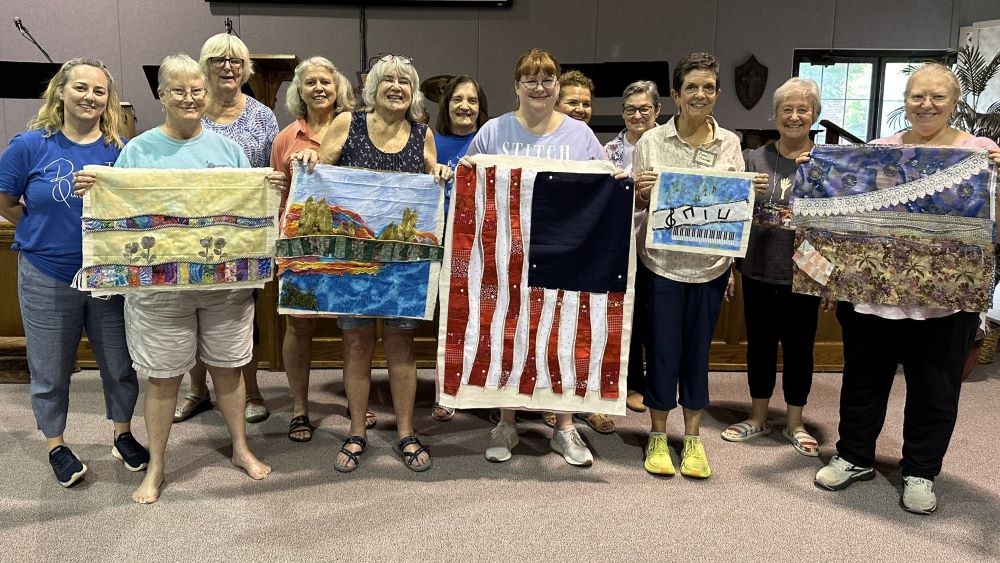
Ripple Effect workshop in Pickens, South Carolina.
During the Event
This is the fun part! Finally we get to meet. I absolutely love being part of a guild, if only for a day or an hour.
1. Take photos of your guest teacher and members in action. Help promote them and your guild by showing off your fabulous guest quilter on social media, your website, newsletter, etc. Even if it’s virtual, take pics of the audience watching, and of the instructor on the screen. So many times I’m focusing on so many other things, I forget to ask someone to take photos for me. Also, get photos of guild members interacting with each other and the instructor. Finally, don’t forget to share the photos with the teacher so he/she can use them to show you off, and for marketing purposes.
2. Be an active audience! If the teacher engages the audience during her talk – respond and play along!
In my “Managing Unfinished Projects” lecture, there are a couple of prompts I give the group to take 3 minutes to discuss amongst themselves. This serves two purposes:
- To interact with the information and help apply what I’ve just discussed to their own quilting.
- To give members opportunities to interact, thereby building community.
Be polite! Sidebar conversations are not only rude, they are also incredibly distracting to the person delivering the presentation as well as the members around you.
On another note, if you feel yourself nodding off – stand up! Presenters would much rather audience members stand in the back if they are tired of sitting still, and can’t help themselves from falling asleep!
Short on time? Let the teacher know by politely interrupting that they have about 10 minutes left. Some guilds are fine with programming running long, while others get antsy after 45 minutes. We would much rather you tell us, than start becoming a hostile audience lol!🤪 This is especially true for virtual presentations to a live audience. We are not there to read the audience, and take nonverbal cues to wrap it up.
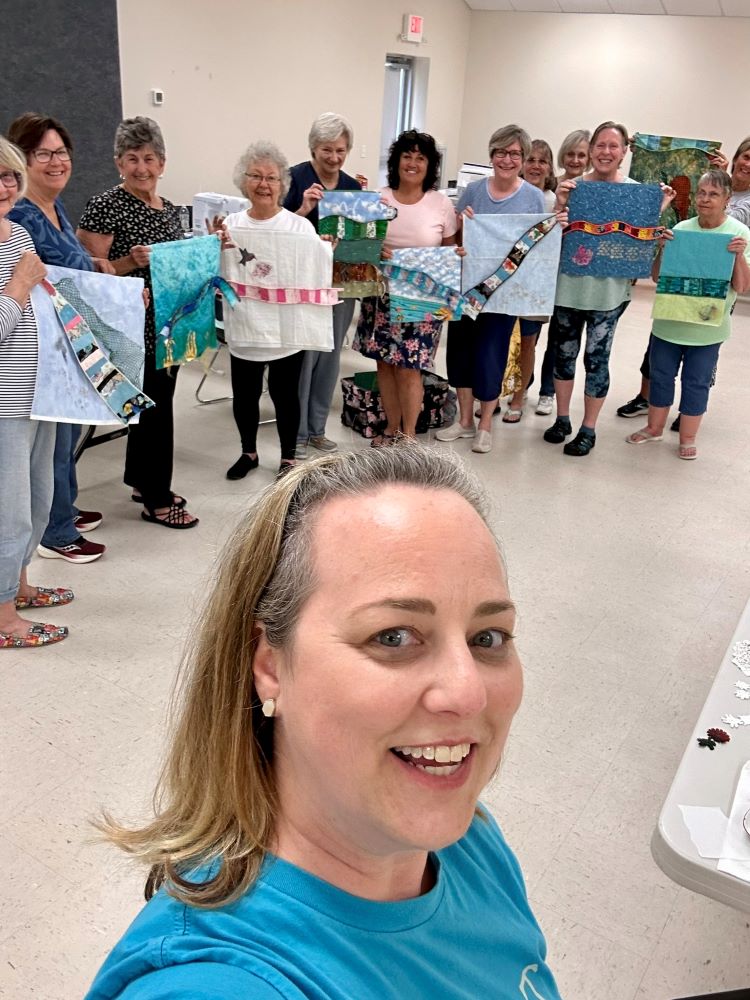
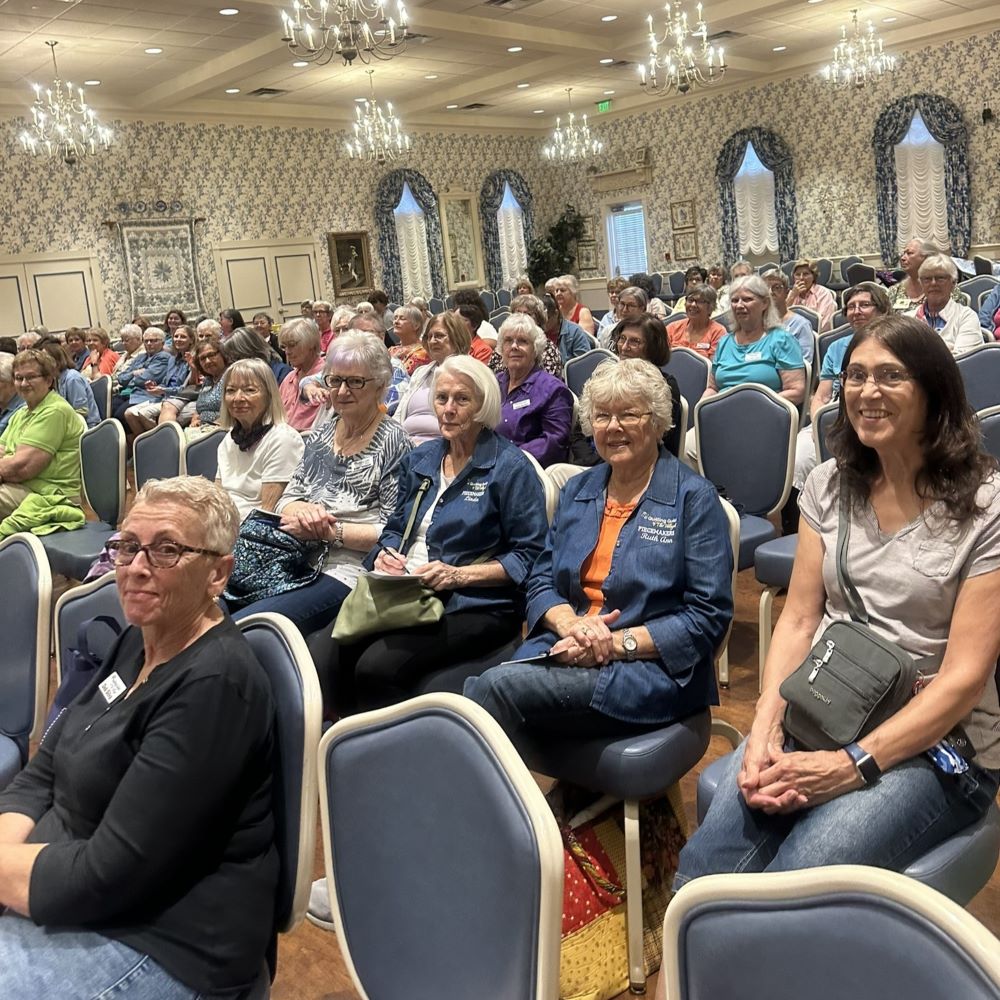
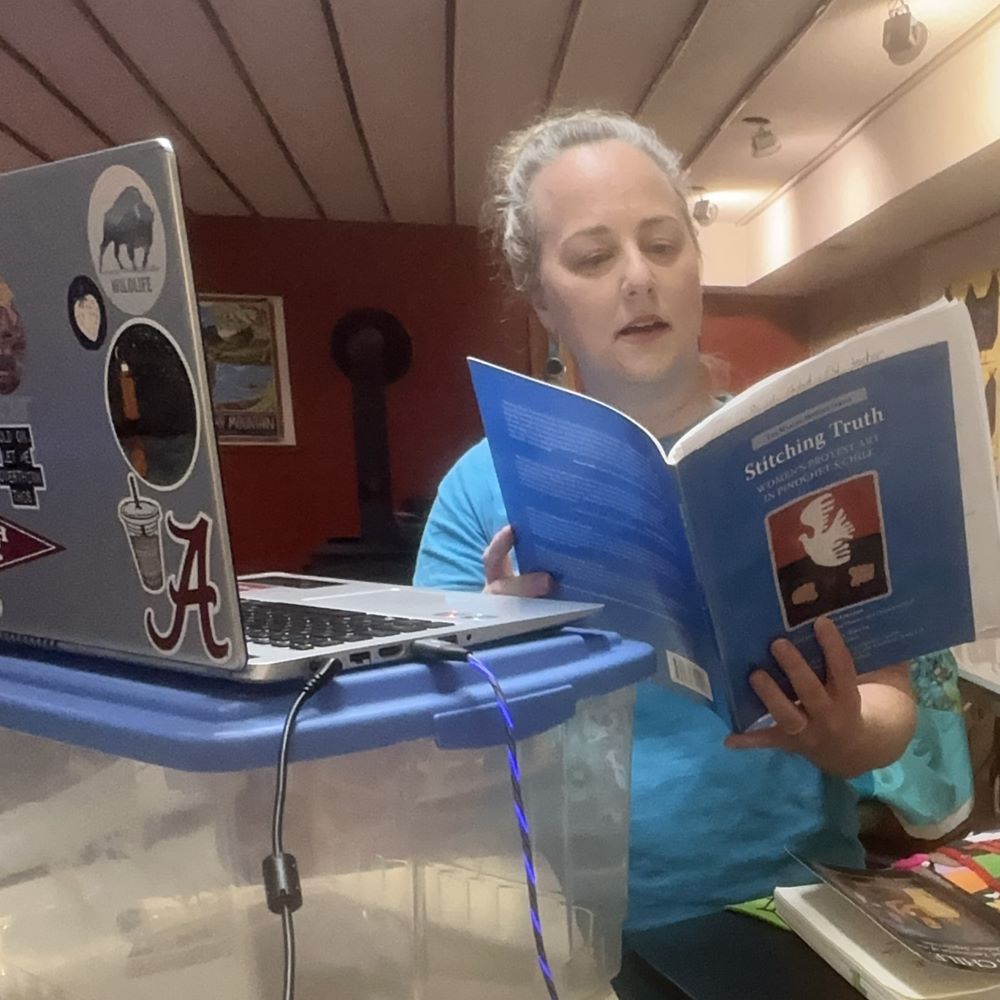
After the Event
1. It goes without saying, but I’ll say it anyway, pay up. If you haven’t paid before the event, settle the fee immediately after. If there are travel expenses after the fact, pay it promptly. Don’t make the teacher have to ask for it.
2. Did you enjoy the class and presentation, like really enjoy it? Please, please, please let us know in writing! Email us your kind thoughts and tell us what you learned and liked. Testimonials are a powerful tool for future bookings. Furthermore, I love hearing from guild members afterwards, especially when they share photos of what they’ve done with what I taught them.
3. Do you have suggestions for improvement? Constructive feedback delivered in a respectful way is so helpful. If all we ever get is positive feedback, then we don’t know how to tweak or improve.
One member emailed me after my most popular and provocative lecture “Arpilleras: Women’s Resistance through Textile Art.” All I had ever heard was how fascinating, thought provoking, and amazing this topic was to guilds. This person said it was too political, and she would have preferred hearing more about the women. Thank you!! While I can’t compeletely take out the political aspect, I immediately began tweaking the presentation. I now provide a more succinct summary of the political aspect of arpilleras, and include more stories of the women who made them, and even more examples of their work. Now, the lecture is better than ever!
A guild told me once that a guest teacher who had traveled in for the event had really turned off the members. During her workshop, she talked animatedly about her “drinking days” and cussed throughout. I assure you no teacher wants to leave a guild event with that reputation. Someone should definitely reach out to her and explain how this came across to members. Again, say it kindly, and perhaps have someone look it over before sending it to ensure the tone is constructive.
Some suggestions may be more technical, like wanting more extreme close-up shots of their quilts in a virtual presentation.
As long as you are kind and constructive, rather than critical, we can take it! It may sting at first, but you will be doing us a favor in the long run.
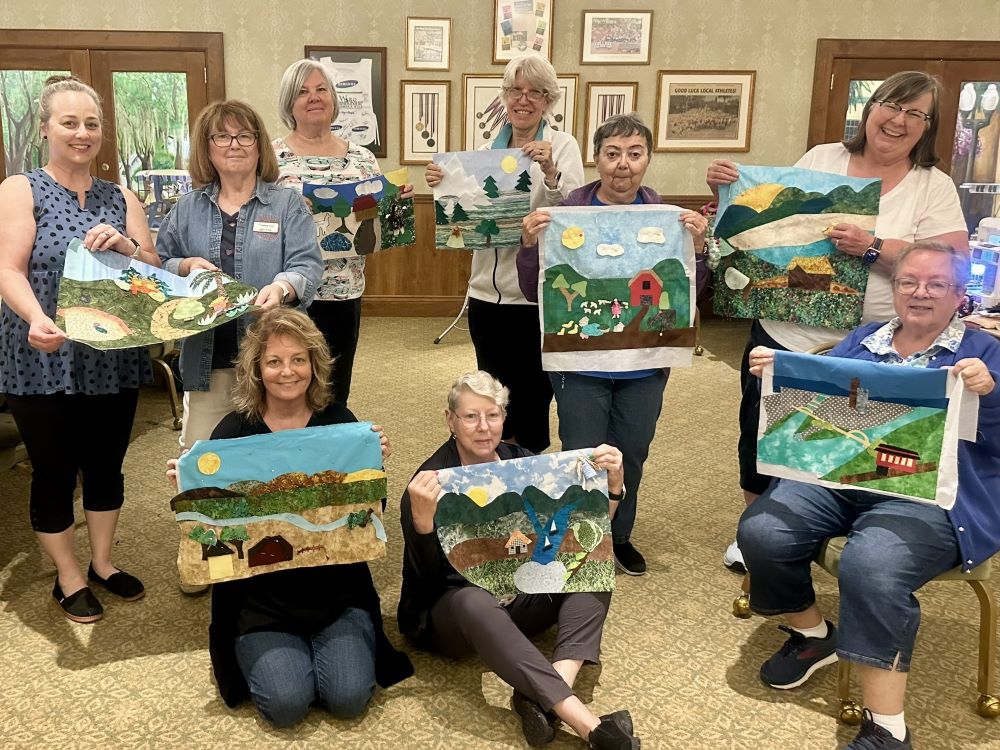
Arpilleras workshop. Quilt Guild of the Villages, Florida.
As I stated earlier, the vast majority of guild-to-teacher interactions are overwhelmingly positive. It’s suggestions like the ones above which help prevent communication frustrations from occurring.
If you are a guild member and would like to fill out the guild suggestions for teachers questionnaire, please do so here. I’d like to follow this up with the guild perspective.
Finally, chime up in the comments and let us know anything else I should include. We would all love to hear what your guild does to ensure smooth sailing with the entire booking process.
